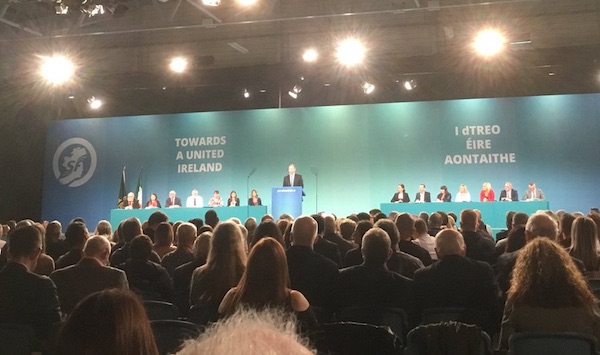
The prospect of a Sinn Fein Tanaiste serving under a Fine Gael or Fianna Fail Taoiseach is closer today after a controversial vote at Sinn Fein’s annual conference in Dublin this weekend.
The decision to allow it to enter negotiations on forming a government as a a junior coalition party is seen as a potential landmark in Sinn Fein’s journey to the corridors of power in Dublin.
In recent years, Sinn Fein has been incrementally opening its policy on coalition with the two main right-wing parties, moving from outright opposition to one embracing the possibility of propping up a left-right government.
Despite a number of reservations expressed by delegates, the party confirmed on Friday evening it was willing to consider entering coalition as a minority party when some 75% or 80% of hands were raised in support of motion eleven.
This came despite the knowledge that no junior party has survived propping up a Fine Gael or Fianna Fail government unscathed, and two of them -- the Progressive Democrats and Democratic Left -- have disappeared entirely from the political stage. Two others, the Labour party and the Green Party, have been decimated to a tiny fraction of their previous support.
However, Sinn Fein’s finance spokesman Pearse Doherty argued the case in a forceful speech. He insisted Sinn Fein must look at any proposal for government and judge each one on its merits. This is not about power but change, he said, adding a final decision would be made by the members of the party at a further special convention.
Sligo/Leitrim TD Martin Kenny said Sinn Fein was right to be cautious about entering a coalition but it must make itself “uncomfortable” and “take risks” to ensure the party had a voice in government.
“We must ensure we do nothing to give our opponents an excuse to beat us,” referring to previous criticism by the other parties of Sinn Fein’s failure to enter negotiations on forming a government after the last election.
The party’s deputy leader Mary Lou McDonald confirmed the vote meant Sinn Fein was willing to go into coalition with either Fianna Fail or Fine Gael after the next election.
“This is not about signing up to say we want to be a junior party, this is us saying we believe that we are ready,” she said.
“We have made it clear we will talk to anybody after the election. I do not think it is fundamentally democratic to think they have a divine right to discount others.”
A final decision on entering a coalition will still have to be taken by a special Ard Fheis, convened for that purpose, although it would be expected to certainly endorse the leadership position.
Despite the collapse of power-sharing in the North and upheaval in Sinn Fein over allegations of bullying and ‘whisper campaigns’ by party management, this year’s annual conference has again seen no protest by party grassroots against the leadership.
However, control of the party is now in a degree of flux, with an old guard bring edged out to make way for a new, more career-minded leadership.
Martin McGuinness, whose death this year which accelerated this process, was remembered fondly in tributes over the weekend. Party leader Gerry Adams is this evening expected to signal that his 34 years as Sinn Fein President will come to an end. One of his own advisers was quoted in the media urging him to go as his leadership “caps our potential growth”.
Mr Adams’s full presidential address will be carried here later today.
![[Irish Republican News]](https://republican-news.org/graphics/title_gifs/rn.gif)
![[Irish Republican News]](https://republican-news.org/graphics/title_gifs/harp.gif)

